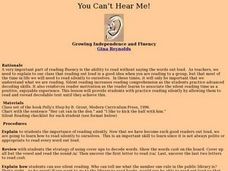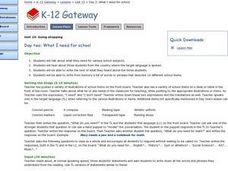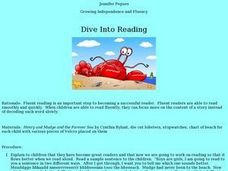Curated OER
Fire! Fire! Fire!
The book Play Ball, Amelia Bedelia, is read with quickness and fluency in this instructional activity. The teacher models slow, choppy oral reading, and then smooth, quick, and fluent oral reading. Then, students read orally with a...
Curated OER
Yay for Expression!
Review the concept of expressive reading. Through modeling, the teacher shows them that more expression makes reading more interesting and enjoyable to listen to. They review ending punctuation marks and the types of expression and...
Curated OER
Ehhhh?
Are your kindergarten learners working with the letter e and the sounds that is makes? They'll practice writing a capital e, hear the /e/ sound in a funny tongue twister, and then identify when the teacher is saying a word that uses...
Curated OER
You Can't Hear Me!
Teach the skill of reading silently through modeling. The teacher demonstrate how to read silently and also gives instructions on decoding skills. Individuals then read silently using the book Polly's Shop . The teacher...
Curated OER
Reading Rainbow
Beginning readers observe and demonstrate a variety of reading expression strategies. They listen to the teacher read the book Ten Hungry Monsters both with and without expression, and discuss the difference. Then it's their turn!...
Curated OER
Character Education: Integrity
Students understand the definition of integrity and explain quotes about it. In this integrity lesson, students apply quotes about integrity to a personal experience and write about it.
Curated OER
Character Education: Honesty
Students explore traits of honest communication. In this character development and communication lesson, students are given 6 simple statements and work as a group to alter the meaning of each statement through body language, facial...
Curated OER
Dangerous Roads in Your Community
Students collect information about dangerous streets and intersections in community, interview law enforcement officials and safety experts to find out what they think can be done to reduce accidents, write in-depth article using these...
Curated OER
What I need for School
You can use this lesson with English language learners, a young language arts class, or speakers of a foreign language. The phrases learned are I need and I don't need. The teacher collects several items around the room, and learners...
Curated OER
Eggbert- The Slightly Cracked Egg: Tolerance, Disabilities, Characater Education
Students discuss the differences, flaws and strengths that we all have using "Eggbert, The Slightly Cracked Egg" by Tom Ross and Rex Barron as inspiration . They color 'slightly cracked' hard-boiled eggs.
Curated OER
Same-Sex Schools Gain Ground
Students examine the issue of having same-sex classes. Using the internet, they research how this program is working around the country. They interview local education experts and determine how they view the issue. They include an...
Curated OER
What Is Legal With Music On The Web?
Students research what is legal now as far as downloading music from the Internet. They also gather information now that some citizens have been charged with crimes. The research allows students to form informed opinions that are educated.
Curated OER
Henry Howls
Let's learn the letter h! Elementary learners will hear the sound, learn a catchy tongue twister, and identify the sound in different words the teacher says. After some writing practice, read A House for Hermit Crab, by Eric Carle,...
Curated OER
Mmm, Mmm ... Good!
Help primary students learn the /m/ sound. As they listen as the teacher introduces the "Secret Code" of language they will practice the /m/ sound by rubbing their tummies as if eating something good. They also practice hearing and...
Curated OER
Dive Into Reading
Learners observe and demonstrate various reading strategies to improve their reading fluency. The teacher first models smooth speech. In pairs, pupils take turns reading from the book Henry and Mudge and the Forever Sea by Cynthia...
Curated OER
Reading Bugs
Review the phonemic sounds of the alphabet letters before examining how to blend letter sounds to make a word. During this teacher-modeled lesson, learners make word bugs out of three phonemes that blend together. As an assessment, read...
Curated OER
Hop on the Express Train to Read Expressively
Encourage beginning readers to read expressively. After the teacher models what it's like to read with expression, pairs of learners work together to practice developing this ability. While one learner reads, the other marks a check-list...
Curated OER
Shhhhh, She is Sleeping
The sheep on the ship was shocked by the Fish on the Shore! Can you guess which digraph we're studying? Take a look at the /sh/ sound with your young readers. Have them write words with the target sound in letter boxes, and then small...
Curated OER
Read it Like You Mean It!
First through third graders observe and demonstrate a variety of reading expression strategies. First start by reviewing some common digraphs and the sounds they make. Then listen to the teacher read different sentences with and without...
Curated OER
Reading With Expression
Reading with fluency and expression is an important skill for beginning readers to develop. They discuss what it means to read with expression and observe the teacher reading Goldilocks and the Three Bears without any interest...
Curated OER
Integrated Skills and Speaking: Reforming Education
Young scholars examine quotes and discuss how education can be reformed. The best ideas are picked and a short presentation further explaining the idea is presented to the class.
Curated OER
Constructivist Theory
Students in a teacher education program are introduced to the constructivist theory. In grade level teams, they take their subject matter focus and create lesson plans related to the constructivist theory. They are graded with a rubric...
Curated OER
Health Education: Stress
Fourth graders tackle stress. In this personal health lesson plan, 4th graders predict physical and emotional reactions to stressful situations.
Curated OER
Health Education: Stress 2
Fourth graders investigate how to deal with stress. In this personal health lesson plan, 4th graders identify family, school, and community resources as sources of social support to reduce or prevent stress.























